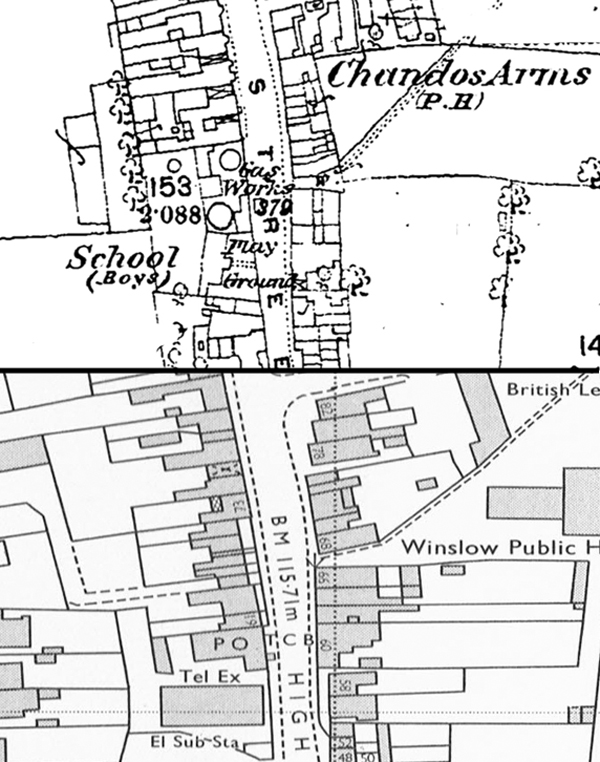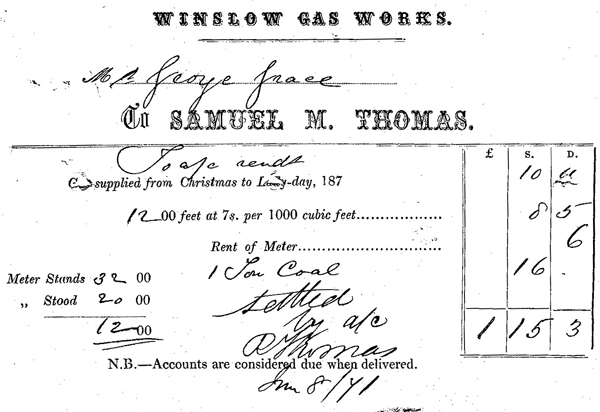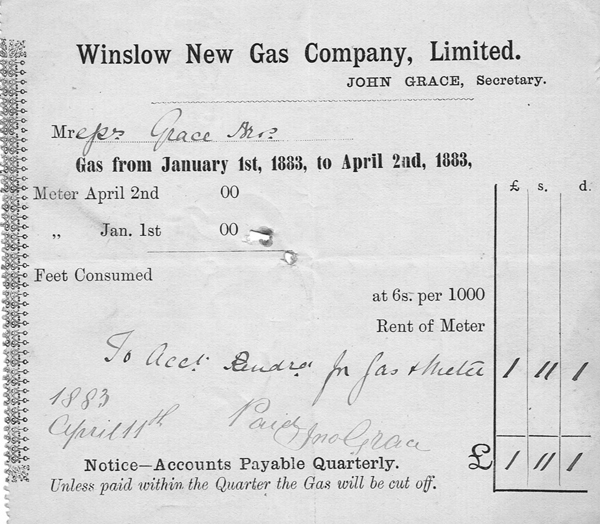
Gas comes to Winslow, 1842-43
Winslow experienced two huge technological advances in the 1840s, the introduction of gas and the building of the railway.
18 Dec 1841, Bucks Herald
The recent meeting of the inhabitants for the purpose of considering the expediency of lighting the town with gas [Vestry, Nov 1841], has given rise to much difference of opinion as to the means and mode of that desirable end. It was long considered that the wealth and prosperity of the people were inadequate to sustain even the expense of common lamps, but such a method of proceeding is now deemed by a certain party as not commensurate with the respectability of the place, and that nothing less than the erection of a gasometer, with its various ramifications, will meet the aspiring views and feelings that have lately arisen amongst them.
15 Oct 1842, Bucks Gazette
If, but a few years since, some favoured individual had been allowed to draw aside the veil of futurity, and catch a glimpse of events to come, and had ventured to predict that in 1842, in the small and unpretending town of Winslow, a gas and coke company would be formed, and measures, consequent thereon, in active operation to supply its inhabitants with the magic and brilliant element, popular opinion would have deemed it but the musings of insanity, and the subject of them a fitting companion of those for whom philanthropy provide, when reason ceases to hold her empire. Such, however, is the fact;- a company is established, - the requisite capital realised,- and, in all probability, within two months, Winslow will become another instance of the spirit of improvement that every where prevails –
“With time progressive mounts the human mind,
And fools alone from custom never change.”
14 Dec 1842, manor court
John Morecraft of Winslow Butcher a Customary Tenant and Mary his wife did in consideration of the Sum of £28 paid by Edward William Selby Lowndes of Winslow Esquire, David Thomas Willis Gentleman, Samuel Burnham Dudley Auctioneer, George Cowley Surgeon, James Hawley Grocer and Alfred Barton Innholder surrender All that Piece of Ground containing by admeasurement 16 poles [484 sq. yds] and being part of a Close of Pasture ground called Crocketts Close, bounded on the east by the Turnpike road leading to Buckingham, on the south by other part of the Close lately sold to the Trustees of the National School and on the west and north by the remaining part of the said Close.
28 Jan 1843, Bucks Herald
We hear that these works are on the eve of completion.
4 Feb 1843, Bucks Gazette
On Tuesday last, the Winslow Gas Company, with their friends, dined together at the George Inn, in celebration of the opening of the works ... it furnishes an instance, almost without a parallel, of a place with only fourteen hundred inhabitans, realizing those fruits of science which general opinion had awarded only where trade and commerce prevails with greater magnitude. The first proposers of the subject, as is the case with all advocates of innovation, were viewed by the majority as projecting a mere Utopian scheme; but fully convinced of its practicability, they prosecuted their object with a perseverance and firmness of purpose which ultimately triumphed over all opposition.
15 Sep 1843: the vestry decided to use funds held by the Poor Law Commissioners for "providing lamp posts for lighting the streets with gas".
The maps below show the gasworks site in 1880 and the same area in 1978; most of this part of Winslow has been rebuilt

Notes
The gasworks were built on what was then vacant land between the newly built boys' school and the Workhouse. 63 High Street is now on the site. More houses were built on the adjacent land during the 1840s, so the gasworks came to be in a fairly central position. In the 1840s coal had to be brought by road from the canal at Buckingham. The arrival of the railway made transport easier but it took until 1880 for the gasworks to be moved to a new site next to the station. Gas was used only for lighting until the 1850s. The development of gas in England started in the 1820s, when nearly all towns with a population of over 10,000 acquired gasworks. Winslow was one of the smallest places to get gas in the early 1840s, possibly as a loss-leader for the contractor:
M.E. Falkus, "The British gas industry before 1850", Economic History Review 20 (1967), 494-508
The contractor erecting a gasworks at the minute Buckinghamshire town of Winslowe [sic] (which had less than 1,500 inhabitants) wrote in 1842: "I am anxious to get gas Apparatus on a small scale as cheap as possible, so that I can erect small works at a cheap rate, and induce people in the small Towns to form gas companies, etc. There is no doubt that in a little time all the small towns will be lit with Gas." [James Malam, 19 Nov 1842]
It has been suggested that Winslow got gas before Buckingham because it was still a dangerous innovation and it would matter less if Winslow was blown up! This doesn't seem to be the case as the technology was well established, and the only danger was financial. In fact the Winslow Gas Company was very successful and its shares were a good investment. Below is the 1871 gas bill for George Grace of Horn Street.

Relocation of the gasworks and formation of the New Gas Company, 1880
24 April 1880, Buckingham Advertiser
PROPOSED REMOVAL AND ENLARGEMENT OF THE WINSLOW GAS WORKS.
These Gas Works were erected in 1843, and at that time stood on the outskirts of the town, but through the town having grown more and more towards the Railway Station, they now occupy a nearly central position, and it has long been wished by the tenants of adjoining houses that they could be removed to some more remote spot, both on account of the unpleasant smells which seem to be inseparable from the manufacture of gas, and also from the fact that the Works are somewhat of an eyesore, occupying as they do one of the best sites in the town.
On Tuesday last, April 20th, a public meeting was held at the Bell Hotel, to consider the practicability of this removal. Mr. A. Barton was nominated to the chair, and amongst those present were- G. R. Greaves, Esq., S. B. Dudley, Esq., T. P. Willis, Esq., H. Bullock, Esq., Mr. Jas. King, Mr. W. Neal, Mr. F. Loffler, Mr. W. H. French, Mr. John Grace, (secretary to the Gas Company) &c., &c.
The Chairman then read the minutes of the last meeting of the shareholders, and also the handbill convening the meeting, and said he desired to see the subject thoroughly ventilated, and the voice of the inhabitants taken as to the desirability of the removal of the works to a more eligible spot.
A letter from Mr. Cooper, of Banbury (the company’s engineer) was then read, giving a rough estimate for removing the works to a distant part of the town.
In answer to a question, Mr. Grace, the secretary, said there was not room enough in the present site to allow of the works being enlarged sufficiently to enable them to have a constant supply of gas.
Mr. T. P. Willis said that their present capital was £1,410, he would propose that the capital be increased to £3,000, and the works removed and enlarged, the present income of the Company was £180, and by the removal they should save £20 a year in carting alone, and he had no doubt that it would pay from 5½ to 6½ per cent. He would propose that the present company be wound up and a new one started, and that the money they would obtain from the sale of the present site, and of the present plant, [illegible] that would be of no use to the new company, together with the balance at bank of £150 be handed over and divided amongst the present shareholders as a premium. He believed that was the feeling at the last meeting of shareholders.
Mr. S. B. Dudley supported the proposition and thought that if the matter was promptly carried out it would be a benefit to everyone in the town.
The proposition seemed to meet with the approbation of every one present, G. R. Greaves, Esq., volunteering to take fifty £10 shares in the new company, Messrs. F. & J. Loffler twenty shares and Messrs. Willis and Willis, French, Neal, and other gentlemen also put down their names for smaller numbers of shares until about 140 towards the 150 required were subscribed, but several gentlemen announced that they should be willing to take a less number of shares than they had subscribed for in case persons who were not then present should wish to become shareholders.
It was then agreed that the following gentlemen should form the Committee for purchasing a site, selecting an engineer, and giving him directions to prepare plans and specifications for the new work:- Messrs. Greaves, Dudley, Willis, Neal, W. H. French, James King, and Barton, and it was agreed that the Committee should inspect the proposed site on the following Thursday.

- Read about the new site: Station Road
New gasometer, 1887
1887: Buckingham Advertiser, 14 May
THE GAS COMPANY.- The annual meeting of the Winslow Gas Company was held at the Bell Hotel, on Monday, May 9th, under the chairmanship of G. R. Greaves, Esq., J.P. The society seems to have a prosperous career before it, as the gas consumed goes on increasing and will require an additional gasometer to supply the wants of its customers.- The directors proposed a dividend of five per cent, which having been seconded, Mr. Henry Ingram proposed, and Mr. John Middleton Smith seconded, “That no dividend will be paid so as to avoid having to borrow more than was absolutely necessary for the new gasometer.”- A rather heated discussion took place as to the propriety of dividing as dividend money which though earned was not in hand at the close of the financial year April 1st.- The one side arguing that as the money was earned in the year it ought to be divided, the other side arguing that uncollected debts ought not to be treated as assets at all, and without there was only about £89 pounds odd in hand available for dividend, while a 5 per cent dividend was carried by an overwhelming majority.- The retiring directors were proposed for re-election.- Mr. J. M. Smith proposed, and Mr. G. Grange [Grainge?] seconded, “That Mr. Henry Ingram be a director.”- The voting which is on the cumulative system, one director present having 21 votes, showed the retiring directors elected by an immense majority.
1887: Buckingham Advertiser, 21 May
WINSLOW GAS WORKS.
THE DIRECTORS of the Winslow New Gas Company (Limited) are preparing to receive TENDERS for EXCAVATING and BRICKING a TANK to contain a Gas Holder 35 feet in diameter and 15 feet deep, according to Plans and Specifications to be seen at the Office of the company’s Works at Winslow.
Tenders, marked “Tender for Tank,” to be addressed to the Chairman, and to be sent in on or before the 1st June next.
The Directors do not bind themselves to accept the lowest or any Tender.
By order of the Directors,
A.
S. MIDGLEY, Secretary.
Winslow, 19th May, 1887,
1887: Buckingham Advertiser, 20 Aug
Winslow new gas holder appears to be a more formidable affair than was anticipated, as owing to the wet nature of the ground steam power has been obliged to be used to draw the water away.
Improvements, 1905
1905: Buckingham Advertiser, 27 May
GAS COMPANY.- The general meeting of the shareholders was held at the Bell Hotel on Thursday, Mr. T. P. Willis presiding, and amongst others present being Mr. J. Hill (manager), Mr. W. N. Midgley (secretary), Mr. Geo. Whichello, Mr. E. R. Midgley, Mr. A. J. Clear. The directors report recommended the payment of a dividend of £5 per cent. to the shareholders; the re-election of the retiring directors, Messrs. T. P. Willis, G. Robinson, and G. Whichello; the appointment of Mr. G. Pass as auditor for the ensuing year; they also reported that, after having been erected for nearly 25 years, a considerable expenditure was necessary on the works, and they had contracted with Messrs. Gibbons Bros., of Dudley, to erect a new retort bench of two arches, and to fix therein 10 new retorts on the patent horse-shoe generator system at a cost of £400, and the work was now in progress.- This report was adopted, and the meeting closed, there being only a very small attendance.
See also:
